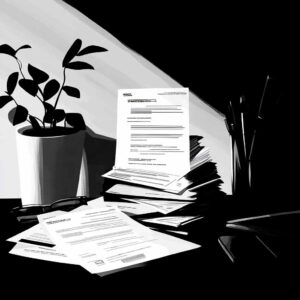In the job market, sometimes the most rewarding paths are those you carve out for yourself. The Letter of Interest stands out as a unique tool, often misunderstood or underutilized by job seekers. This article aims to demystify this important document, providing insights into its purpose, differences from traditional cover letters, and best practices for writing an impactful Letter of Interest.
What Is a Letter of Interest?
Unlike a cover letter that accompanies a resume for a specific job opening, a Letter of Interest is a self-initiated correspondence. It’s a proactive approach to express your enthusiasm for a company or an organization, even when they have not advertised a job opening. This letter serves as a platform to showcase your skills, experiences, and the unique value you can bring to the company, essentially highlighting why you would be a great fit for their team.
Why Write a Letter of Interest?
Writing a Letter of Interest can be a strategic move in your job search. It demonstrates your initiative, interest, and research about the company, setting you apart from other candidates.A well-crafted Letter of Interest reflects your proactivity, passion, and commitment to your career aspirations. By understanding its purpose, crafting it thoughtfully, and targeting the right audience, your Letter of Interest can open doors to opportunities that might otherwise remain hidden. It’s particularly useful for:
- Reaching out to companies not actively hiring: It allows you to get on the radar of potential employers who might keep you in mind for future openings.
- Networking: It’s a tool to expand your professional network, potentially leading to informational interviews or referrals.
- Exploring hidden job markets: Many positions are filled even before they are advertised. A Letter of Interest can give you access to these opportunities.
The Difference Between a Letter of Interest and a Resume Cover Letter
While both documents are used in job applications, they serve different purposes and contexts:
- Purpose: A cover letter is written for a specific job opening, directly responding to the job description. A Letter of Interest is more exploratory, inquiring about potential opportunities without a specific role in mind.
- Content: Cover letters often focus on how your skills match the job requirements. In contrast, a Letter of Interest is broader, emphasizing your overall fit for the company culture and long-term goals.
- Timing: Cover letters are sent during an active job application process. Letters of Interest can be sent anytime, regardless of hiring cycles.
Essential Components of a Letter of Interest
Understanding what to include and what to avoid is crucial in crafting a letter that effectively communicates your intentions and qualifications. Here’s a breakdown of the essential components of a typical Letter of Interest:
What to Include
- Professional Heading: Start with your contact information at the top, followed by the date, and then the recipient’s details. This should include your name, address, phone number, email, and similarly, the recipient’s name, title, company, and company address.
- Formal Greeting: Address the recipient by name if possible. If the specific name is unknown, use a general but professional salutation like “Dear Hiring Manager”.
- Introduction: Begin with a clear statement of purpose. Mention why you are writing and how you learned about the company. This should be concise, engaging, and tailored to the specific company.
- Body Paragraphs:
- First Paragraph: Elaborate on your interest in the company. Mention what you admire about the company’s culture, values, or achievements.
- Middle Paragraph(s): Here, highlight your relevant skills, experiences, and achievements. Discuss your professional background and how it aligns with the company’s goals or potential needs. Remember to focus on transferable skills if you’re changing industries.
- Closing Paragraph: Express your eagerness to explore opportunities and contribute to the company. It’s also a good spot to suggest a follow-up, like a meeting or call.
- Formal Closing: End with a professional closing statement like “Best regards” or “Sincerely,” followed by your name.
What to Avoid
- Being Vague: Avoid generic statements. Tailor your letter specifically to the company, showing that you’ve done your research.
- Rehashing Your Resume: Your Letter of Interest should complement, not repeat, your resume. Focus on how your experiences make you a great fit for the company, rather than listing your qualifications.
- Overly Long Letters: Keep it concise. A one-page letter is typically sufficient to convey your interest and qualifications.
- Negativity or Arrogance: Stay positive about your experiences and avoid boasting or negative remarks about past employers.
- Grammar and Spelling Mistakes: Proofread your letter. Typos or grammatical errors can detract from your professionalism.
By including these essential components and steering clear of common pitfalls, your Letter of Interest will stand out as a thoughtful, well-crafted introduction to potential employers. Remember, this letter is your opportunity to make a memorable first impression, so take the time to tailor it to each company and position yourself as a valuable future team member.
Tips and Best Practices for Writing a Letter of Interest
- Research Thoroughly: Understand the company’s values, culture, and recent achievements. Tailor your letter to resonate with their ethos.
- Be Specific: Mention why you are interested in that particular company. Generic letters rarely make an impact.
- Highlight Unique Skills: Discuss what makes you a valuable asset. Focus on skills that align with the company’s objectives.
- Keep It Concise: Like any professional correspondence, brevity is key. Aim for one page.
- Professional Tone: Maintain a formal yet approachable tone.
- Proofread: Ensure your letter is free from typos or grammatical errors.
Targeting the Right Audience and Sending Your Letter
Identify the right person to address your letter to. This could be a hiring manager, department head, or even a higher-level executive, depending on the company size and structure. Use LinkedIn or the company’s website to find the appropriate contact.
The mode of sending your letter can vary. Email is the most common and professional approach. However, in certain industries, a hard copy sent via mail can make a strong impression. Regardless of the method, ensure that your letter is presented in a professional format.
Letter of Interest Templates You Can Use Now.
Template 1: Career Change or New Field Entry
This letter of interest template is ideal for individuals looking to pivot into a new career or enter a completely new field. It focuses on showcasing transferable skills and articulating a strong, genuine interest in the new industry. The letter aims to bridge the gap between previous experiences and the desired field, highlighting adaptability and a keenness to learn.
[Your Name] [Your Address] [City, State, Zip] [Your Email] [Your Phone Number] [Date] [Recipient's Name] [Recipient's Title] [Company Name] [Company Address] [City, State, Zip] Dear [Recipient's Name], I am writing to express my keen interest in potential opportunities within [Company Name], particularly in the realm of [specific department or field, e.g., Marketing, Engineering]. While my professional background has primarily been in [Your Current Industry], I am deeply passionate about [New Industry or Field] and am eager to bring my skills and experiences to this new avenue. Throughout my career in [Your Current Industry], I have developed a robust skill set that I believe is highly transferable and relevant. My experience in [mention a specific skill or experience, e.g., project management, customer service] has equipped me with a unique perspective and a diverse toolkit that can contribute significantly to [Company Name]. [Mention any specific achievement or project relevant to the new field]. I am particularly drawn to [Company Name] because of [mention something specific about the company – its values, innovative approach, industry reputation]. I am excited about the prospect of contributing to such a dynamic and forward-thinking environment, and I am particularly interested in [mention a particular aspect of the company or department you are interested in]. Enclosed is my resume, which provides more detail about my professional journey. I am enthusiastic about the possibility of discussing how my background, skills, and enthusiasms can align with the exciting work being done at [Company Name]. Thank you for considering my application. I look forward to the opportunity to discuss how I can contribute to the ongoing success of your team. Warm regards, [Your Name]
Template 2: Recent Graduate or Entry-Level Professional
This letter of interest template is crafted for recent graduates or individuals in the early stages of their career. It emphasizes educational achievements, relevant coursework, internships, and a strong desire to launch a professional career. The focus is on potential and eagerness to learn and grow within the company.
[Your Name] [Your Address] [City, State, Zip] [Your Email] [Your Phone Number] [Date] [Recipient's Name] [Recipient's Title] [Company Name] [Company Address] [City, State, Zip] Dear [Recipient's Name], I am a recent graduate from [Your University] with a degree in [Your Major], and I am writing to express my interest in potential opportunities at [Company Name]. As a new entrant into the workforce, I am eager to apply my academic learning and internship experiences in a professional setting, particularly in an innovative and esteemed organization like yours. During my time at [Your University], I was actively involved in [mention any relevant academic projects or organizations]. This experience, coupled with my coursework in [mention relevant courses], has equipped me with [mention specific skills or knowledge relevant to the company or industry]. I am particularly impressed by [mention something specific about the company – its innovation, culture, projects] and believe that my background in [Your Field of Study] aligns well with the goals of your team. While I am at the beginning of my professional journey, I am enthusiastic, quick to learn, and extremely motivated to contribute positively to [Company Name]. Enclosed is my resume, which outlines my academic achievements and internships in greater detail. I am keen on the possibility of joining [Company Name], where I can contribute to your innovative projects and, at the same time, grow as a professional. I look forward to the opportunity to discuss how my educational background and aspirations can align with the exciting opportunities at [Company Name]. Thank you for considering my application. I am very excited about the opportunity to contribute to and learn from your esteemed team. Best regards, [Your Name]
Template 3: Experienced Professional Seeking Specific Company Alignment
Designed for seasoned professionals, this letter of interest template focuses on aligning the individual’s extensive experience with a specific company’s mission, values, or projects. It highlights particular achievements and expertise that resonate with the company’s objectives, demonstrating a clear and informed interest in the organization.
[Your Name] [Your Address] [City, State, Zip] [Your Email] [Your Phone Number] [Date] [Recipient's Name] [Recipient's Title] [Company Name] [Company Address] [City, State, Zip] Dear [Recipient's Name], As an experienced professional in [Your Field/Industry], with over [Number of Years] years of experience, I am writing to express my profound interest in [Company Name]. My career thus far has not only equipped me with extensive knowledge and skills in [Your Field/Industry] but has also honed my ability to [mention specific skills or experiences]. I am particularly drawn to the work being done at [Company Name] and am eager to bring my expertise to your esteemed team. Throughout my career, I have had the opportunity to [mention a few significant achievements or projects]. These experiences have given me a deep understanding of [mention specific aspects relevant to the company, like industry trends, technological advancements, etc.]. I am especially impressed with [Company Name]'s work in [mention specific projects, values, or aspects of the company], and I see a strong alignment between my expertise and the goals of your organization. I am particularly excited about the opportunity to contribute to [mention a specific aspect or project at the company]. With my background in [Your Field/Industry] and my proven track record in [mention specific skills or achievements], I am confident that I can bring a unique perspective and value to your team. Enclosed is my resume, which details my professional journey and achievements. I am very enthusiastic about the possibility of discussing how my background and vision align with the innovative work at [Company Name]. Thank you for considering my application. I look forward to the prospect of contributing to the continued success and growth of [Company Name]. Warm regards, [Your Name]
As we’ve explored, the key difference between a Letter of Interest and a traditional cover letter lies in their purpose and context. While a cover letter is specific to a job opening, addressing how your skills match the job requirements, a Letter of Interest is a proactive approach, expressing your enthusiasm and fit for a company even in the absence of a job listing. It’s about showcasing your unique value proposition and aligning your skills and experiences with the company’s overall ethos and future potential roles.
Write a Letter of Interest Automatically Using AI
If you’re ready to take the next step in your career journey, whether it’s a leap into a new field, starting fresh as a recent graduate, or aligning your established career with a specific company’s mission, Word.Studio is here to assist. Try our AI-powered Letter of Interest Generator or our Traditional Cover Letter Writer to quickly generate a draft tailored to a specific company and position. Let us help you make a powerful first impression and open doors to new opportunities.









